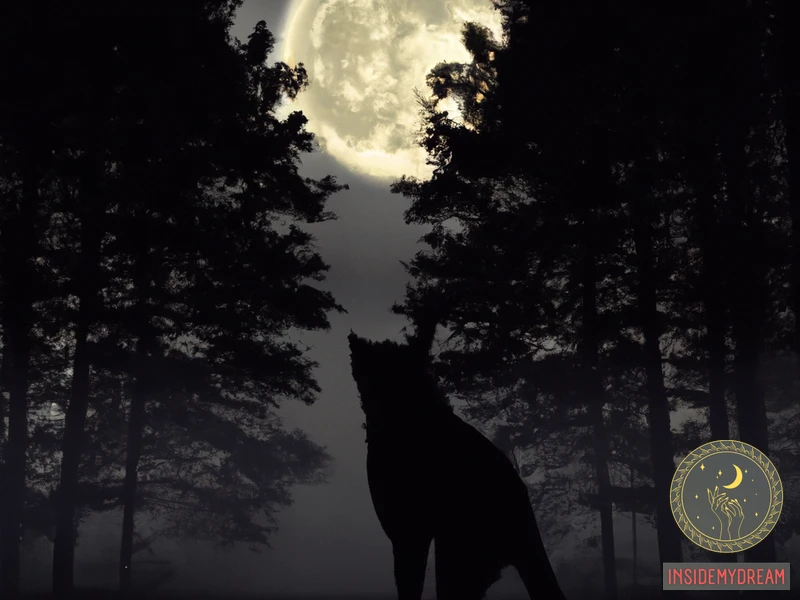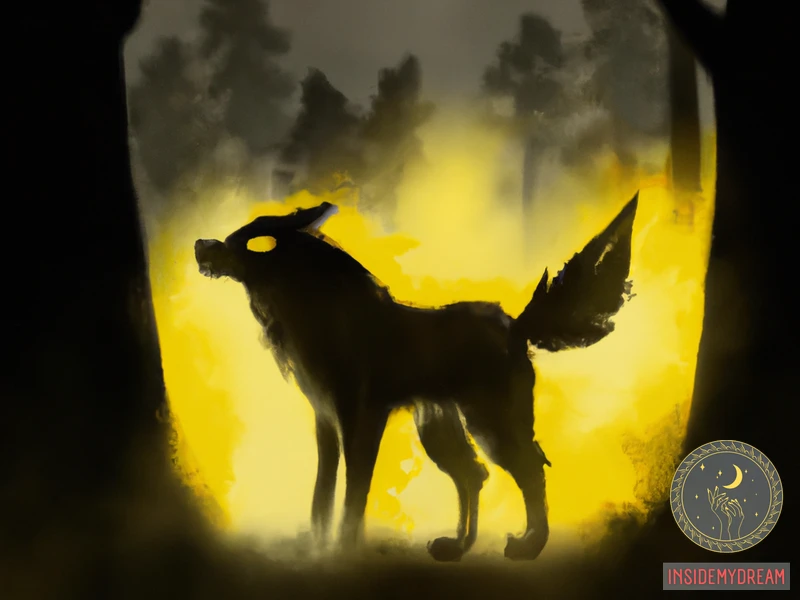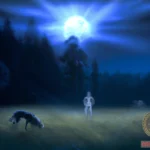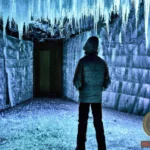Have you ever woken up in a cold sweat, heart pounding, after a dream where you were being chased by a creature with sharp fangs and fur? Maybe that creature was a werewolf. The idea of werewolves has captivated our imaginations for centuries, gracing the pages of literature and appearing on film and TV screens. But what does it mean to dream about being chased by a werewolf? Is it just a product of our imagination, or is it a message from our subconscious? In this article, we’ll explore the symbolism of werewolves in popular culture and myths, delve into the psychological and spiritual interpretations of werewolf dreams, and try to uncover the common meanings behind being chased by a werewolf in our dreams. So, hold tight, and let’s sink our teeth into this perplexing topic.
The Symbolism of Werewolves in Popular Culture and Myths

As we explore the mysterious world of dreams, one recurring image that continues to captivate our imaginations is that of the werewolf. Throughout history, the werewolf has been a potent symbol of transformation and raw power, appearing in numerous mythologies and cultural traditions around the world. From ancient legends of shape-shifting shamans to modern-day portrayals in literature and film, the werewolf represents a powerful archetype that speaks to something deeply primal within our collective psyche. In this section, we’ll dive deeper into the symbolism of werewolves in popular culture and myths, uncovering the rich history and complex meanings behind this fascinating creature.
The History of Werewolves in Folklore
Werewolf folklore can be traced back hundreds, if not thousands of years in various cultures. The ancient Greeks, for example, had the legend of Lycaon, a king who was transformed into a wolf by the god Zeus in punishment for serving him human flesh. In Norse mythology, there were the Úlfhéðnar, warriors who donned wolf pelts and fought with the strength and ferocity of the beasts. In the Americas, the Navajo believe in the legend of the yee naaldlooshii, or skinwalker, who could transform into any animal they desired, including wolves.
In Europe during the Middle Ages, alleged werewolf sightings and accusations of “lycanthropy” (the transformation into a wolf) were rampant. Werewolves were often associated with witches, and some believed that they could only be killed by silver objects. The famous werewolf trials of the 16th and 17th centuries in France saw dozens of people accused of transforming into wolves and committing murders and other atrocities.
Of course, the question of whether werewolves ever actually existed remains unanswered. It is possible that the legends arose from sightings of wolves, or from people with medical conditions such as hypertrichosis (excessive hair growth) being ostracized and labeled as werewolves. Regardless of their origins, werewolves have become a staple of popular culture and continue to fascinate and terrify people today.
Werewolves in Literature and Film
Werewolves in literature and film have been portrayed in many different ways throughout history. Some tales depict them as savage beasts terrorizing villages while others see them as misunderstood creatures trying to find their place in the world. One of the most well-known examples of a werewolf in literature is “The Wolfman,” a horror novel by Guy Endore. In this story, the protagonist undergoes a transformative experience that turns him into a werewolf, highlighting the idea of transformation and change.
Another classic example is Bram Stoker’s “Dracula,” in which a werewolf is portrayed as one of the many minions of the infamous vampire. The werewolf is described as a fierce creature with extraordinary strength, speed, and agility with little control over their actions.
In more modern literature and film, the portrayal of werewolves has shifted. The “Twilight” series, for example, depicts werewolves as protectors rather than predators. Similarly, in the “Underworld” series, werewolves called lycans are portrayed as a noble and proud race that has been hunted and enslaved by vampires.
While different stories may have varying portrayals of werewolves, the underlying theme of transformation remains constant. Werewolves are often seen as a representation of transformative change, both physically and mentally, including dealing with inner conflicts and the darkest parts of ourselves. This symbolism can be seen in films like “An American Werewolf in London” or “The Howling” which portray the werewolf transformation as intense and often violent.
The representation of werewolves in literature and media is complex and ever-changing. However, the symbolic meaning of transformation often remains the same whether it be the physical transformation seen in literature and film or the more metaphorical transformation that occurs within dreams.
Werewolf Dreams: A Psychological Interpretation
As we explore the enigmatic world of the werewolf in dreams, it’s important to consider one’s own psychological interpretation of this mythical creature. The subconscious mind is a complex and intricate landscape, and our dreams can reveal a lot about what’s going on beneath the surface of our waking lives. By examining our internal emotional states and the symbolism of the werewolf, we can gain a deeper understanding of ourselves and our experiences. So, let’s take a journey through the psychological interpretation of werewolf dreams and see what insights we can uncover. If you want to know more about other dream interpretations, you can check our article about bull dreams.
Understanding the Unconscious Mind
One of the key elements in understanding the symbolism of werewolves in dreams is delving into the unconscious mind. The unconscious mind is the part of our mind that we are not aware of during our waking hours, yet it still influences our thoughts, feelings, and behaviors.
According to renowned psychologist Carl Jung, the unconscious mind can be seen as a treasure trove of symbols and archetypes that hold the key to unlocking our deepest desires and fears. In particular, the archetype of the werewolf is seen as a manifestation of our primal instincts and untamable nature.
However, interpreting the symbolism of werewolves in dreams requires a level of introspection and self-awareness. It involves looking beyond the surface-level details of the dream and examining what deeper message the dream may be trying to convey. For example, if the dream involves the dreamer becoming a werewolf, this could represent a desire to tap into their wild, uninhibited side or to break free from societal constraints.
On the other hand, if the dream involves being chased by a werewolf, it could represent a sense of feeling threatened or pursued by an aspect of the self that the dreamer is not comfortable confronting. In this case, it may be helpful to explore other recurring dreams or symbols to gain a better understanding of what is going on in the unconscious mind.
Understanding the unconscious mind is a crucial component in interpreting the symbolism and meaning of werewolf dreams. By exploring our innermost fears and desires, we can gain a deeper understanding of ourselves and the world around us.
Werewolf Dreams and Fear
People who have werewolf dreams often experience fear, whether it’s during the dream or upon waking up. Fear is a natural human response to a perceived threat or danger, and when we’re being chased by a werewolf in our dreams, it’s easy to feel scared and helpless.
One reason we may feel afraid in a werewolf dream is that we’re facing a creature that’s unfamiliar and often portrayed as dangerous or evil in popular culture. Werewolves are often associated with chaos, violence, and unpredictability, which can tap into our primal fears and leave us feeling vulnerable.
However, fear in dreams may not always be a bad thing. In fact, some researchers believe that our dreams help us process and work through emotions we experience in our waking life, including fear. By confronting the source of our fear (in this case, a werewolf), we may be able to better understand and cope with the things that frighten us in real life.
It’s also worth noting that the fear we experience in a werewolf dream may not be directly related to the werewolf itself. Our dreams often use symbolic imagery to represent deeper fears or anxieties we may have, and the werewolf could be a metaphor for something else entirely. For example, someone who dreams of being chased by a werewolf might actually be struggling with feelings of inadequacy or a sense of being hunted or persecuted in their waking life.
Whatever the underlying cause of the fear, it’s important to acknowledge and process these emotions rather than dismissing them as just a dream. By exploring our fears and anxieties, we can better understand ourselves and work towards healing and growth.
Transformative Change
In the context of werewolf dreams, the idea of transformative change is significant. The image of a werewolf, with its ability to transform from a human to a wolf, represents the idea of transformation and change. This transformation can be seen as a metaphor for personal growth and development.
Transformative change in werewolf dreams can be interpreted as:
- Embracing change: If you are being chased by a werewolf in your dreams, it can suggest that change is coming or needed in your life. It may be a fear of change that is driving the dream, but it can also be an indication that it’s time to embrace change and move forward.
- Letting go of the past: Being chased by a werewolf can represent unresolved issues from the past that need to be addressed. The fear of being caught by the wolf may be a fear of confronting these issues, but it can also be seen as an opportunity to face them and move on.
- Personal growth: Transformation is often associated with growth and development. The werewolf in your dreams can represent your own personal growth and the changes that are occurring internally. The dream may be a reminder to embrace these changes and allow them to propel you forward.
It’s important to note that change can be difficult and scary, which may be why the werewolf in your dream is chasing you. However, if viewed as an opportunity for growth and transformation, it can be empowering. Accepting change and transformation can lead to personal growth and a better quality of life.
If you find yourself continually having werewolf dreams, it’s important to explore the meaning behind them. Keeping a dream journal, reflecting on your feelings, and seeking therapy can help you understand the deeper meaning behind these dreams.
The Shadow Self
The Shadow Self refers to the parts of ourselves that we keep hidden or repressed. According to Carl Jung, the Shadow is the unconscious aspect of the personality that is largely negative and primitive. It comprises of qualities that we deem unacceptable, undesirable or shameful, such as greed, jealousy, anger, and aggression. Werewolf dreams can be interpreted as the manifestation of the Shadow Self. When we are chased by a werewolf in our dreams, we experience a sense of terror and horror, which can be symbolic of our repressed desires and tendencies that we are afraid to confront.
In many ways, werewolves represent the uncivilized, primal side of humanity. The werewolf’s transformation from human to beast serves as a metaphor for the release of our innermost desires and impulses. Just as the werewolf transforms during a full moon, we may experience a transformation during our dreams, allowing us to confront the darker aspects of our personality.
Through werewolf dreams, we can face our fears and gain a better understanding of the root causes of our negative emotions. When we face and acknowledge our Shadow Self, we become more whole and can experience greater self-acceptance and personal growth. However, if we continue to suppress or ignore our Shadow, it can manifest in destructive ways, such as addiction or aggression.
To fully comprehend the meaning of being chased by a werewolf in our dreams, it is important to explore our unconscious mind and examine our repressed feelings and desires. We can start by keeping a dream journal and analyzing our dreams, seeking therapy or talking to a trusted friend or family member about what we have discovered. By confronting the Shadow Self within us, we can achieve a greater sense of balance and mental well-being.
| Symbolism of The Shadow Self | Interpretation |
|---|---|
| Repressed desires and tendencies | Werewolf dreams can reflect our hidden desires and personality traits that we keep hidden or repressed. |
| Primal and uncivilized | Werewolves symbolize the primal and uncivilized side of ourselves that we often try to ignore. |
| Transformation | The transformation of the werewolf can represent a transformation of our own inner nature. |
| Destructive forces | When the Shadow Self is ignored or suppressed, it can manifest in negative ways, such as addiction or aggression. |
If you are interested in further exploring the symbolic meaning of dreams, you can read more about the dream of climbing stairs, dreams about being a lesbian, or the meaning of black opal in dreams.
Werewolf Dreams: A Spiritual Interpretation

As we explored the psychological interpretation of werewolf dreams in the previous section, we now delve into the spiritual aspect of these dreams. When we dream of werewolves, we might question whether there could be a deeper message hidden in our subconscious. Many cultures associate werewolves with specific spiritual interpretations related to animal spirits and transformation. We will examine the werewolf symbolism as a catalyst for change and self-discovery. So if you’ve been having werewolf dreams, it’s time to uncover the spiritual meaning behind them. This interpretation might shed light on the potential message these dreams bring. Perhaps, it’s related to an aspect of the dreamer that they were not aware of. Let’s explore this further to understand the spiritual symbolism of werewolf dreams. (You can find more information about dream interpretation through basketball dreams, California dreams, monocle dreams, broken denture dreams, and falling dreams in our dream dictionary.)
The Power of Animal Spirits and Archetypes
The power of animal spirits and archetypes is a significant aspect of dream analysis in many cultures. In many spiritual contexts, the wolf is viewed as a symbol of power and strength, and its inclusion in a dream may be an indication of growth and transformation.
Animal spirits and archetypes are symbolic representations of the qualities and characteristics of animals, and they are believed to have a spiritual significance in many cultures. These representations can be seen in various forms of art, literature, and media, but the most powerful and profound depiction is through dreams. Dreams involving animal spirits can often have deeper meanings hidden within the subconscious of the dreamer.
The wolf, in particular, is viewed as a powerful and influential animal spirit by many. It has a prominent place in the folklore of many Native American tribes and is often associated with courage, loyalty, and a strong sense of intuition. As a spiritual symbol, the wolf can represent aspects of the shadow self, such as aggression, impulsiveness, or a fierce protective nature.
Dreams relating to animal spirits can often serve as an indication of important changes occurring in a person’s life. If a person is chasing or being chased by a wolf, it may signify that they are undergoing transformative changes or facing a significant challenge that will require strength and courage to overcome. Alternatively, it may also be an indication of the inner conflict between the light and dark aspects of the self.
While some may view dreams of animal spirits as simply a manifestation of the unconscious mind, many see them as opportunities for deeper reflection and self-exploration. By understanding the symbolism of these dreams and embracing the power of the animal spirits within them, individuals may be able to gain a greater understanding of their true selves and move forward in life with renewed strength and purpose.
It is essential to note that the interpretation of animal spirits in dreams may vary depending on the context of the dreamer’s life and culture. Understanding the dream in its entirety is crucial for a proper analysis.
Perhaps, dreams featuring animal spirits or archetypes can help you solve mysteries such as the meaning of California dreams, a broken denture dream, a dream of playing basketball or a dream of falling from height.
The Werewolf as a Symbol of Transformation
The werewolf as a symbol of transformation
In many cultures, werewolves are seen as creatures that represent transformation. The idea of a human transforming into a wolf is seen as a metaphor for the changes that individuals go through in their lives, particularly during times of upheaval or trauma.
Werewolves have also been associated with the cycles of nature, particularly the phases of the moon. Just as the moon waxes and wanes, so too do our lives go through cycles of growth and decay. The werewolf represents the idea of embracing these cycles and understanding that change is an inevitable part of life.
Werewolves are also seen as symbols of the animalistic and instinctual side of human nature. The transformation from human to wolf can represent a transformation from a civilized and controlled individual to a more wild and primal one. This transformation can be both terrifying and liberating, as it allows individuals to tap into aspects of themselves that they may have been repressing.
The werewolf is a complex and multifaceted symbol that can represent a variety of ideas and emotions. Whether seen as a symbol of transformation, a representation of our primal nature, or something else entirely, werewolves continue to captivate and intrigue us in popular culture and in our dreams.
If you want to know more about dream meanings, you can check our article about monocle dream meaning.
The Dark Side of the Self
When it comes to the symbolism of werewolves in dreams, one popular interpretation is that they represent the dark side of the self. This refers to the parts of our personality that we may not be fully aware of or that we try to repress, such as our fears, anger, and other negative emotions. These aspects of ourselves can take on a life of their own in the form of a werewolf, leading us to feel chased or hunted in our dreams.
The concept of the dark side of the self is not a new one. Psychologist Carl Jung referred to it as the shadow self, which he believed was an important part of self-discovery and personal growth. Jung believed that facing and accepting our shadow selves was necessary for achieving wholeness and spiritual enlightenment.
In the context of werewolf dreams, the dark side of the self can be seen as a metaphor for the parts of ourselves that we may be afraid to confront or acknowledge. Perhaps we have deep-seated fears or insecurities that we don’t want to face, or we may be grappling with feelings of anger or resentment that we don’t fully understand.
It’s important to note that the dark side of the self is not inherently bad or evil. Rather, it is a necessary part of our personality that we must learn to accept and integrate into our lives. By embracing our shadow selves, we can learn important lessons about ourselves and become more aware of our own strengths and weaknesses.
So, if you find yourself being chased by a werewolf in your dreams, it may be a sign that you need to confront the darker parts of your personality. By doing so, you can gain a deeper understanding of who you are and take steps towards personal growth and self-improvement.
Common Interpretations of Being Chased by a Werewolf in Dreams
Have you ever woken up in a cold sweat after being chased by a werewolf in your dreams? It’s a common yet perplexing experience that can leave one feeling shaken and confused. While dreams can often be a reflection of our daily experiences, being chased by a werewolf takes it to another level. Many wonder what it could mean and whether it has any significance beyond a simple dream. In this section, we’ll explore some common interpretations of this particular dream, delving into the possible meanings behind it. So, put on your detective hat and let’s explore the mysteries of werewolf dreams together.
Feeling Threatened or Unsafe
One possible interpretation of being chased by a werewolf in your dreams is feeling threatened or unsafe. The werewolf in this context represents an external danger that is chasing you, and the fear and anxiety it produces can be indicative of underlying feelings of vulnerability or powerlessness in your waking life.
Here are some possible reasons why this interpretation might apply to you:
- You may be experiencing stress or anxiety related to a recent change or challenge in your life, such as a job loss, a relationship breakdown, or a health issue.
- You may be feeling overwhelmed by external pressures, such as work demands, financial worries, or social expectations.
- You may have experienced a traumatic event in your past that has left you feeling vulnerable or fearful.
- You may be struggling with feelings of inadequacy or low self-esteem, leading you to feel like you are constantly under threat.
If you find that this interpretation resonates with you, it may be helpful to explore these underlying feelings and try to address them directly. Seeking support from friends, family members, or a therapist can be a good place to start. Additionally, practicing self-care activities such as exercise, meditation, or creative expression can help you feel more grounded and empowered in the face of perceived threats.
Feeling Isolated or Rejected
People often feel isolated or rejected in their lives, and this can manifest in their dreams as being chased by a werewolf. Isolation and rejection can lead to feelings of vulnerability, fear, and anxiety, all of which can be reflected in werewolf dreams. If you frequently have dreams of being chased by a werewolf, it may be an indication that you are struggling with feelings of disconnection from those around you.
These feelings can stem from a variety of sources, such as struggles with social anxiety, relationship issues, or even childhood trauma. It is important to explore these feelings and work to identify the root cause of your isolation or rejection. This can be a difficult and uncomfortable process, but it is essential for your well-being.
One way to start addressing these feelings is to reach out to loved ones or seek out new connections in your life. Remember that you are not alone, and there are people who care about you and want to support you. It can also be helpful to engage in self-care practices, such as exercise, meditation, or creative pursuits, to help you manage your emotions and find a sense of purpose and fulfillment.
If you find that your feelings of isolation and rejection are impacting your daily life or persisting despite your efforts to address them, consider seeking the support of a therapist or mental health professional. They can help you work through these difficult emotions and develop strategies for building stronger connections with others and experiencing a greater sense of belonging and acceptance.
Embracing Inner Change
Inner change is a significant part of what it means to be human. To embrace inner change means to recognize that personal growth and transformation are essential to living a fulfilling life. In the context of werewolf dreams, being chased by a werewolf may point to the need for inner transformation. According to dream interpretation experts, this type of dream can prompt individuals to reflect on the changes they need to make in their lives to improve their overall well-being.
However, embracing inner change is not always easy. It can be a daunting process that requires a great deal of introspection and self-discovery. Often, people resist change because it forces them to confront their own limitations or inadequacies. But, by embracing inner change, individuals gain the ability to let go of past mistakes, move past their fears, and lead a more fulfilling life.
One way to embrace inner change is to practice mindfulness. By paying attention to the present moment and accepting things as they are, individuals can reflect on their thoughts and emotions and take steps towards personal growth. Additionally, therapy can be a useful tool for those who are struggling with emotional or psychological issues that may be preventing them from embracing change.
Another way to embrace inner change is to engage in creative activities. Writing, painting, or playing music can help individuals explore their emotions and understand themselves on a deeper level. By tapping into their creativity, individuals can gain insights into their own thought processes, emotions, and desires, which can help them make the necessary changes in their lives.
Ultimately, embracing inner change is a lifelong journey. It requires patience, perseverance, and a willingness to confront one’s inner demons. By facing these challenges head-on, individuals can gain a greater understanding of themselves and create a more fulfilling life for themselves.
Confronting the Shadow Self
One of the most compelling interpretations of being chased by a werewolf in your dreams is that it represents your shadow self – the aspects of your personality that you try to hide from yourself or others. This theory is based on the idea that our unconscious mind tries to communicate with us through dreams, and that the werewolf is a symbol of the darker, less desirable aspects of ourselves.
Confronting the shadow self can be a difficult and uncomfortable process, but it is an important step towards self-awareness and personal growth. Here are some ways to begin confronting your shadow self:
- Recognize your negative traits: Take some time to reflect on the parts of yourself that you don’t like or try to hide. These could be anything from jealousy to insecurity to anger. Acknowledge that they exist within you and try to understand where they come from.
- Accept yourself: It’s important to remember that everyone has negative traits. Accepting yourself – flaws and all – is the first step towards changing them.
- Bring your shadow self to light: Once you’ve recognized and accepted your negative traits, it’s time to confront them. This could mean talking to a therapist or trusted friend, journaling your thoughts and feelings, or simply acknowledging them the next time they surface. The key is to bring them into your conscious mind so you can begin to work through them.
- Transform negative traits into positive ones: Rather than simply trying to suppress or hide your negative traits, focus on transforming them into positive ones. For example, if you struggle with anger, try to channel that energy into something productive like exercise or activism.
Remember, confronting your shadow self is a journey, not a destination. But by embracing your flaws and working to transform them, you can become a more self-aware and compassionate person.
What to Do If You Keep Having Werewolf Dreams
If you find yourself frequently being chased by a werewolf in your dreams, it’s normal to feel perplexed and even worried. You may wonder what these recurring dreams could possibly mean for your life. Fortunately, there are steps you can take to explore the potential meanings behind these dreams and gain deeper insight into your psyche. In this section, we’ll discuss some practical tips for what to do if you keep having werewolf dreams. By implementing these strategies, you can begin to unlock the mysteries of your subconscious and find greater clarity and understanding.
Keeping a Dream Journal
One technique that can be helpful for understanding and interpreting your werewolf dreams is keeping a dream journal. This involves writing down your dreams in as much detail as possible as soon as you wake up.
Why is keeping a dream journal important?
Dreams can be fleeting and easily forgotten, so writing them down can help you remember them more accurately. This is important because even small details in a dream can hold significant meaning.
Keeping a dream journal allows you to look back on your dreams over time and identify patterns or recurring themes. This can provide insight into your subconscious mind and help you understand any underlying emotions or issues that may be affecting your dreams.
How to keep a dream journal
1. Keep a notebook and pen by your bed so you can easily write down your dreams as soon as you wake up.
2. Write down as much detail as possible, including any people, animals, or objects that appeared, as well as any actions or events that occurred.
3. Note any emotions or feelings you experienced during the dream, as well as any emotions you may have woken up with.
4. Try to identify any symbols or imagery that stood out to you and write down any associations you have with them.
5. Don’t worry if your dreams don’t always make sense or follow a logical narrative. Just write down whatever you can remember.
Using your dream journal to interpret werewolf dreams
Once you have a few werewolf dreams recorded in your journal, you can start to look for patterns and themes. For example, do you always feel fear when the werewolf appears? Is there a particular setting or scenario that seems to be associated with the werewolf?
You can also use your dream journal to explore your emotions and feelings around the werewolf. Do you feel like you are being chased or hunted? Do you feel like the werewolf represents a part of yourself?
By analyzing your dreams over time and exploring your emotions and associations, you may be able to gain a deeper understanding of the meaning behind your werewolf dreams.
Exploring Your Feelings
Exploring Your Feelings in relation to werewolf dreams is a crucial step in understanding their underlying meaning. These dreams can elicit strong emotions that may be connected to your personal life experiences and current mental state. Thus, examining your feelings can help you unravel their significance and the message they convey.
One way to explore your feelings is by creating an emotion chart that lists down the different emotions you experience during the dream. In one column, write down the emotions you felt towards the werewolf, and in another column, record the emotions you felt towards yourself. Finally, in a third column, write down any associations or memories that come to mind when you explore each emotion listed.
Another approach to exploring your feelings during the dream is through the use of guided meditation and visualization. By imagining and visualizing the dream scenario, you can delve deeper into the emotions you experienced and begin to understand their roots.
It is also essential to look at how these strong emotions and feelings relate to your waking life. Ask yourself, “what is currently happening in my life that could be triggering these emotions?” Reflecting on your personal life experience can help you better understand the hidden meanings behind your dreams.
Exploring your feelings in relation to werewolf dreams is a crucial step in unraveling their underlying significance. By understanding your emotions and their connection to your waking life, you can begin to create positive change and growth in both your conscious and unconscious mind.
| Emotions towards Werewolf | Emotions towards Self | Associations or Memories |
|---|---|---|
| Fear | Powerless | Reminds me of a past traumatic experience where I felt powerless and vulnerable. |
| Anger | Threatened | I feel threatened at work by a co-worker who intimidates me. |
| Confusion | Lost | I just started college and am feeling lost and unsure about my future. |
Seeking Therapy
Navigating the complexities of the subconscious mind can be a daunting task, and it’s not always easy to do it alone. If you find that your werewolf dreams are causing you distress or interfering with your daily life, it may be time to consider seeking help from a trained professional.
Therapy can provide a safe and supportive environment where you can explore the underlying issues that may be contributing to your dreams. A therapist can help you gain insight into your thoughts, feelings, and behaviors, and assist you in developing coping mechanisms and strategies to deal with them.
It’s important to note that seeking therapy does not mean that there is anything inherently wrong with you. In fact, therapy can be a sign of strength, as it shows a willingness to confront and address the issues that are causing discomfort or distress.
There are many different types of therapy available, and it’s important to find a therapist who is a good fit for you. Some people prefer cognitive-behavioral therapy, which focuses on identifying and changing negative thought patterns and behaviors. Others may find that a more holistic approach, such as mindfulness-based therapy or expressive arts therapy, better suits their needs.
If you’re not sure where to start, you can ask your doctor for a referral or search online for therapists in your area. Many therapists offer free consultations, which can be a good opportunity to ask questions and determine whether a particular therapist is a good fit for you.
Remember, seeking therapy is an investment in your well-being and personal growth. With the help of a trained professional, you can gain a better understanding of yourself and your dreams, and develop the skills and strategies you need to lead a fulfilling and satisfying life.
Conclusion
In conclusion, the meaning of being chased by a werewolf in your dreams can vary depending on the individual’s personal experiences and subconscious mind. While some may interpret it as a feeling of being threatened or unsafe, others may see it as a call to embrace inner change and confront their shadow self.
Through exploring the symbolism of werewolves in popular culture, myths, and folklore, we can better understand the deeper meanings behind werewolf dreams. From a psychological perspective, werewolf dreams may represent transformative change and the power of the shadow self. On a spiritual level, the werewolf can symbolize the power of animal spirits and archetypes of transformation.
If you find yourself continually having werewolf dreams, it may be helpful to keep a dream journal to track patterns and emotions present in these dreams. Additionally, exploring your feelings and seeking therapy may assist in uncovering any underlying issues. Remember, werewolf dreams are a complex symbol and may hold unique meanings for each individual, so examining your personal associations and experiences may provide further insights.
Overall, werewolf dreams can serve as a powerful tool for introspection and self-discovery. By embracing the symbolism and meaning behind these dreams, we can gain a deeper understanding of our inner selves and the changes we may need to make in our waking lives.
Frequently Asked Questions
Why do werewolves represent transformation?
Werewolves are often associated with transformation because they embody the idea of a human turning into a powerful and deadly animal. This transformation can represent personal growth and change, as well as the ability to tap into our primal instincts.
What is the shadow self?
The shadow self is a concept in psychology that refers to the unconscious parts of our personality that we repress or deny. These can include negative emotions, desires, and impulses that we find uncomfortable or unacceptable.
How can werewolf dreams help us confront our fears?
Werewolf dreams can evoke feelings of fear and threat, which can help us confront our own inner fears and insecurities. By facing these fears in our dreams, we become better equipped to face them in our waking lives.
What is the significance of being chased by a werewolf in a dream?
Being chased by a werewolf in a dream can represent feelings of being pursued or hunted by something outside of ourselves. This can be a reflection of our own inner anxieties or external stressors in our lives.
How can exploring our dreams through journaling help us understand our psychological state?
Journaling our dreams can help us better understand the symbolism and meaning behind our unconscious thoughts and emotions. By recording our dreams and interpreting them, we can gain insight into our own psychological and emotional state.
What is the power of animal spirits in spiritual interpretation?
Animal spirits are believed to possess qualities and characteristics that can serve as powerful symbols and guides for personal growth and transformation. By connecting with these spirits, we can tap into their wisdom and power to help us navigate our own spiritual journey.
Why do werewolf dreams often evoke feelings of fear?
Werewolf dreams can evoke feelings of fear because they tap into our primal instincts and the concept of a deadly predator chasing after us. These dreams can also represent our own inner fears and anxieties, which may manifest as a threatening presence in our dreams.
What is the difference between a spiritual and psychological interpretation of werewolf dreams?
A spiritual interpretation of werewolf dreams focuses on the symbolic and spiritual meaning of the dream, while a psychological interpretation examines how the dream reflects our own subconscious emotions and desires. Both interpretations can provide valuable insights into our own personal growth and transformation.
Can seeking therapy help with recurring werewolf dreams?
Yes, seeking therapy can be helpful for processing and interpreting recurring werewolf dreams. A therapist can help guide us through the interpretation process and provide tools for coping with any underlying psychological or emotional issues.
What should I do if I am constantly being chased by a werewolf in my dreams?
If you are experiencing recurring werewolf dreams or other unsettling dream experiences, it may be helpful to keep a dream journal, seek therapy, and explore your emotions and triggers related to these dreams. It is also important to take care of your physical and emotional health by practicing self-care and managing stress.









